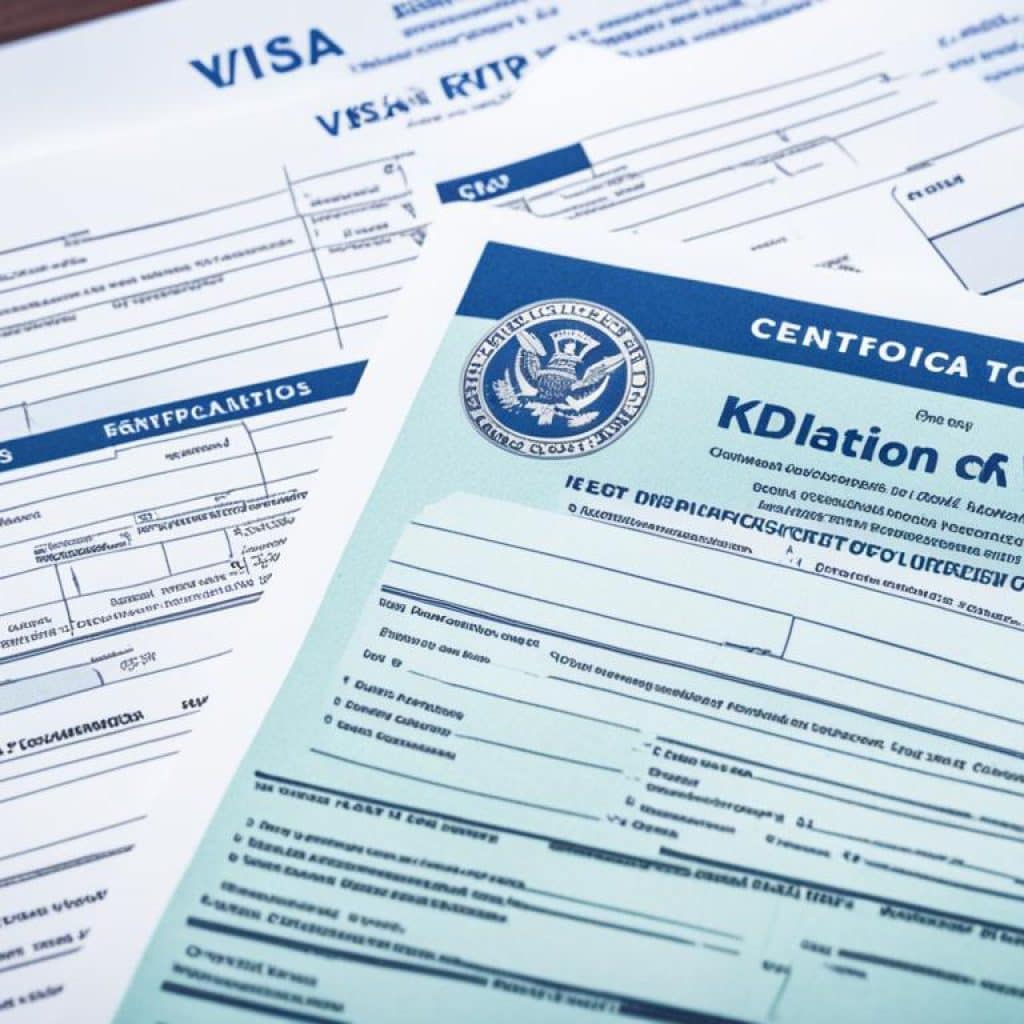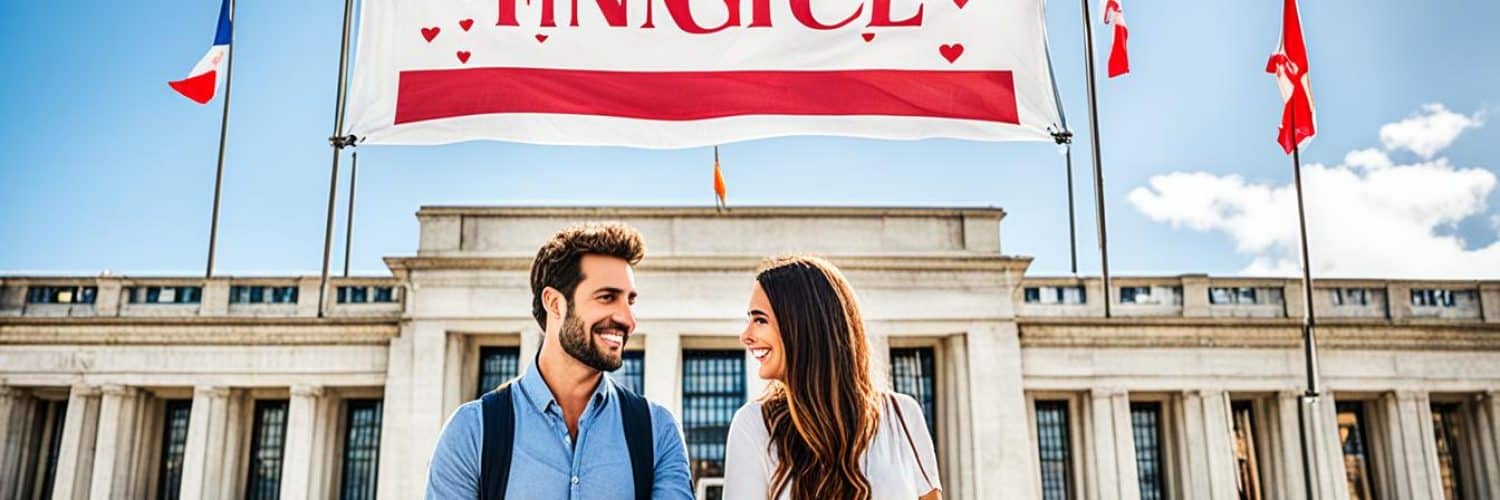Are you planning to marry your foreign-citizen fiancé(e) and bring them to the United States? The process of obtaining a Fiance visa, also known as a K-1 visa, may seem daunting, but it doesn’t have to be. In this comprehensive guide, we will walk you through the steps and requirements to secure your Fiance visa with confidence.
Applying for a Fiance visa involves several essential steps, from filing a petition to attending a visa interview. Along the way, you’ll need to gather and submit required documents, demonstrate financial support, and navigate the application process. We will provide you with all the necessary information and tips to ensure a smooth and successful visa application.
Whether you want to know how to get a Fiance visa, understand the Fiance visa requirements, or learn about the Fiance visa timeline, this guide has got you covered. Prepare yourself for the journey towards uniting with your loved one and starting a new chapter together in the United States.
Key Takeaways:
- Obtaining a Fiance visa allows a US citizen to bring their foreign-citizen fiancé(e) to the US for marriage.
- The Fiance visa process entails filing a petition, submitting required documents, attending a visa interview, and paying necessary fees.
- The US citizen sponsor and the foreign-citizen fiancé(e) must meet specific eligibility requirements.
- Required documentation includes completed forms, passports, birth certificates, police certificates, and evidence of a genuine relationship.
- A medical examination and proof of financial support are necessary for the Fiance visa application.
What is a K-1 Fiance Visa?
A K-1 Fiance Visa is a nonimmigrant visa that allows a US citizen to bring their foreign-citizen fiancé(e) to the US for the purpose of getting married. The visa grants the foreign-citizen fiancé(e) entry into the US to marry their US citizen sponsor within 90 days of arrival. Following the marriage, the foreign-citizen spouse can apply for adjustment of status to become a lawful permanent resident.
Getting married to a foreign-citizen fiancé(e) is an exciting milestone in many people’s lives. The K-1 Fiance Visa facilitates this process by providing a legal pathway for couples to unite and build a life together in the United States. This visa category recognizes the importance of the relationship and enables couples to navigate the immigration system smoothly.
| K-1 Fiance Visa | Fiance Visa Definition | Fiance Visa Purpose |
|---|---|---|
| Allows a US citizen to bring their foreign-citizen fiancé(e) to the US | Nonimmigrant visa category for fiancé(e)s | Uniting couples for the purpose of marriage and future residency |
| Provides entry into the US and a 90-day period to get married | A legal pathway to marriage for couples separated by international borders | Facilitating the formation of families in the United States |
| Allows the foreign-citizen spouse to apply for adjustment of status | Recognizes the significance of the relationship and provides a pathway to permanent residency | Enabling foreign-citizen spouses to legally reside and work in the US |
The K-1 Fiance Visa offers couples an opportunity to be together in the United States, fostering love, connection, and the pursuit of a life shared under the rights and protections offered by the US legal system. The visa serves as a stepping stone towards a future of stability and happiness for couples embarking on their journey of marriage and immigration.
Key Requirements for a K-1 Visa
To be eligible for a K-1 Visa, there are several key requirements that both the US citizen sponsor and the foreign-citizen fiancé(e) must meet.
- Legal Ability to Marry: Both parties must be legally able to marry. This means that they are not currently married to someone else and meet the age requirements set by the country where the marriage will take place.
- Meeting in Person: The couple must have met in person at least once within the past two years. This requirement demonstrates that the relationship is genuine and not solely for the purpose of obtaining a visa.
- Evidence of a Genuine Relationship: To prove the authenticity of their relationship, the couple must provide documentation such as photographs, travel itineraries, communication records, and joint financial records.
- Demonstrating Financial Support: The US citizen sponsor must demonstrate their ability to financially support their fiancé(e) by meeting certain income requirements. This is to ensure that the foreign-citizen fiancé(e) will not become a public charge.
Meeting these requirements helps ensure that the marriage is legitimate and the intentions of both partners are genuine. It is essential to provide all necessary documentation to support the visa application and establish the credibility of the relationship.

By meeting these key requirements, couples can enhance their eligibility for a K-1 Visa and increase their chances of obtaining approval for their visa application.
Filing the Petition
Filing a petition for a Fiance visa is the first step in the process of bringing your foreign-citizen fianceÌ(e) to the United States. This crucial step involves submitting Form I-129F, also known as the Petition for Alien Fiancé(e), to the United States Citizenship and Immigration Services (USCIS).
The purpose of filing this petition is to demonstrate your eligibility as the US citizen sponsor and the bona fide nature of your relationship with your fianceÌ(e). To support your petition, you will need to provide supporting documents that establish the authenticity of your relationship, such as photographs together, correspondence, and evidence of visits.
Once the petition is complete and all required documentation is assembled, you can submit it to USCIS for review. It is important to ensure that all information provided is accurate and complete to avoid delays or potential denial of the petition.
After USCIS receives your petition, they will review it to ensure that you meet the eligibility criteria and that your relationship is genuine. If USCIS determines that the petition is complete and meets the necessary requirements, they will approve it and forward it to the National Visa Center (NVC) for further processing.
Your petition is the first step in obtaining a Fiance visa for your partner. Make sure to carefully follow the instructions, provide all required documents, and submit the petition within the designated timeframe. By doing so, you can increase your chances of a successful outcome and bring your loved one closer to joining you in the United States.
| Documents Required for Filing the Petition |
|---|
| Form I-129F, Petition for Alien Fiancé(e) |
| Evidence of US citizenship |
| Proof of intent to marry within 90 days of entry to the US |
| Supporting documents to establish the bona fide nature of the relationship |
Applying for a Visa
Once your petition is approved by USCIS, the next step in the Fiance visa process is applying for a visa. Here’s a breakdown of what you need to do:
Gather necessary documentation
Before applying for your Fiance visa, make sure you have all the required documentation ready. This includes:
- Passport
- Birth certificate
- Police certificates
- Medical examination results
- Evidence of your relationship with your US citizen sponsor
Complete Form DS-160
Form DS-160 is the online nonimmigrant visa application that you need to fill out. It collects information about you, your background, and the purpose of your visit to the US. Make sure to provide accurate and honest information.
Schedule a visa interview
After completing Form DS-160, you need to schedule a visa interview at the nearest US embassy or consulate. The interview is a crucial step in the process as it determines whether your Fiance visa will be granted. Be prepared to answer questions about your relationship, your intentions in the US, and other relevant topics.
Required Documentation
When applying for a Fiance visa, it is crucial for both the US citizen sponsor and the foreign-citizen fiancé(e) to submit the necessary documents to support their application. These documents play a vital role in proving the authenticity of the relationship and ensuring a smooth application process. Here is a comprehensive list of the required documents for a Fiance visa:
| Document | Description |
|---|---|
| Form I-129F | The completed petition for Alien Fiancé(e) that must be filed by the US citizen sponsor. |
| Form DS-160 | The online nonimmigrant visa application form that must be completed by the foreign-citizen fiancé(e). |
| Passports | A valid passport for both the US citizen sponsor and the foreign-citizen fiancé(e). |
| Birth Certificates | Official birth certificates for both the US citizen sponsor and the foreign-citizen fiancé(e). |
| Divorce or Death Certificates | If either the US citizen sponsor or the foreign-citizen fiancé(e) has been previously married, divorce or death certificates must be provided. |
| Police Certificates | Police certificates from all countries where the foreign-citizen fiancé(e) has lived for more than six months since the age of 16. |
| Medical Examination Results | A report from an authorized panel physician verifying the foreign-citizen fiancé(e)’s health status. |
| Evidence of Financial Support | Documentation proving that the US citizen sponsor has the financial means to support the foreign-citizen fiancé(e) during their stay in the US. |
| Photographs | Recent photographs of the US citizen sponsor and the foreign-citizen fiancé(e) that meet the specifications provided by the US embassy or consulate. |
It is essential to ensure that all required documents are accurate, up-to-date, and properly formatted. Any missing or incomplete documents may result in delays or complications in the application process. Double-checking the documentation is crucial to ensure a successful Fiance visa application.
Having all the necessary documents ready and organized can help streamline the Fiance visa application process and increase the chances of a favorable outcome. The next section will cover the medical examination and vaccination requirements for the Fiance visa application.
Medical Examination and Vaccination Requirements
As part of the Fiance visa application process, the foreign-citizen fiancé(e) is required to undergo a medical examination by an authorized panel physician. The purpose of the medical examination is to ensure that the applicant does not have any health conditions that would pose a threat to public health in the US. This examination is an important step in the visa process to protect both the applicant and the public.
During the medical examination, the authorized panel physician will conduct a thorough assessment of the applicant’s medical history and perform a physical examination. The physician will check for communicable diseases, such as tuberculosis and syphilis, as well as evaluate overall health conditions.
It is important to note that while vaccination is not required for the Fiance visa issuance, it may be necessary for adjustment of status after marriage. Applicants are encouraged to fulfill the vaccination requirements during the medical examination to ensure a smoother transition to permanent residency.
Authorized Panel Physician
Only authorized panel physicians designated by the U.S. Department of State are permitted to conduct the medical examination for the Fiance visa application. These physicians have the knowledge and experience to assess the applicant’s health status accurately and ensure compliance with the required medical standards.
“The authorized panel physician plays a crucial role in determining the applicant’s eligibility for a Fiance visa and safeguarding public health. They have been authorized by the U.S. government to perform the medical examination and provide the necessary documentation for the visa application process.”
To find an authorized panel physician in your country, visit the website of the nearest U.S. embassy or consulate. They will provide a list of designated physicians who are qualified to conduct the medical examination.
Vaccination Requirements
Although vaccination is not mandatory for the Fiance visa issuance, it is highly recommended to fulfill the vaccination requirements during the medical examination. This will help ensure that the applicant is protected against vaccine-preventable diseases and meet the necessary vaccination standards for adjustment of status after marriage.
The specific vaccine requirements may vary depending on factors such as the applicant’s age, medical history, and current vaccination status. The authorized panel physician will provide guidance on the recommended vaccines based on these factors. Some commonly required vaccines may include:
- Hepatitis B
- Influenza
- Measles, mumps, and rubella (MMR)
- Tetanus, diphtheria, and pertussis (TDAP)
It is important to discuss any concerns or questions regarding the vaccination requirements with the authorized panel physician during the medical examination.
Overall, the medical examination and vaccination requirements are essential steps in the Fiance visa application process. By completing these requirements with the guidance of an authorized panel physician, applicants can ensure their health and compliance with U.S. immigration regulations.
| Key Points |
|---|
| The medical examination is mandatory for the Fiance visa application to ascertain the applicant’s health condition and determine if they pose any public health risks. |
| Authorized panel physicians designated by the U.S. Department of State are responsible for conducting the medical examination. |
| Vaccination requirements are not mandatory for the Fiance visa issuance but are recommended to ensure compliance for adjustment of status after marriage. |
| Applicants should consult with the authorized panel physician regarding the recommended vaccinations based on their age, medical history, and vaccination records. |
Proof of Financial Support
One of the essential requirements for the Fiance visa application process is providing proof of financial support. This is crucial to demonstrate to the United States Citizenship and Immigration Services (USCIS) that the US citizen sponsor has the means to support their foreign-citizen fiancé(e) during their stay in the US. Two common forms used to fulfill this requirement are the Affidavit of Support, using either Form I-134 or Form I-864.
The Affidavit of Support is a legal document that assures the US government that the sponsor will not rely on public assistance programs and can provide the necessary financial support to their fiancé(e). This document shows the financial stability and commitment of the sponsor to take care of their spouse-to-be.
If the US citizen sponsor’s income meets the necessary criteria set by the USCIS, they can generally use Form I-134, Affidavit of Support. This form is commonly used when the sponsor’s household income does not exceed 250% of the federal poverty guidelines.
On the other hand, if the sponsor’s income does not meet the requirements for Form I-134, they may need to use Form I-864, Affidavit of Support Under Section 213A of the INA. This form typically applies when the US citizen sponsor is petitioning for an immediate relative, such as a fiancé(e), and their household income is above 125% of the federal poverty guidelines.
The specific income requirements may vary depending on the sponsor’s circumstances and the location of the US embassy or consulate where the visa interview takes place. It is crucial to carefully review the instructions provided by the USCIS and properly complete the required form to avoid any delays or complications in the visa application process.
| Form | Situation | Income Requirement |
|---|---|---|
| Form I-134 | Household income does not exceed 250% of the federal poverty guidelines | 250% of the federal poverty guidelines |
| Form I-864 | Household income is above 125% of the federal poverty guidelines | 125% of the federal poverty guidelines |
Submitting the appropriate Affidavit of Support ensures that the US citizen sponsor can financially support their fiancé(e) during their time in the US. This document plays a critical role in the Fiance visa application process, providing assurance to the immigration authorities that there will be no burden on public resources.
Remember, fulfilling the financial support requirement is an essential part of the Fiance visa application process. By carefully completing the appropriate Affidavit of Support, you can demonstrate your commitment to supporting your foreign-citizen fiancé(e) and increase your chances of a successful visa application.
Fees for a Fiance Visa
Obtaining a Fiance visa involves various fees that applicants need to consider and budget for. Understanding the different fees associated with the Fiance visa application process is crucial to avoid any financial surprises along the way.
1. Filing Fee for Form I-129F
When applying for a Fiance visa, the US citizen sponsor is required to file Form I-129F, the petition for Alien Fiancé(e). This form requires a filing fee, which should be paid to the United States Citizenship and Immigration Services (USCIS). The current filing fee is Fiance visa fees.
2. Nonimmigrant Visa Application Processing Fee
After the petition is approved by USCIS, the next step is for the foreign-citizen fiancé(e) to complete Form DS-160, the online nonimmigrant visa application. While specific fees may vary depending on the US embassy or consulate where the visa interview takes place, applicants can expect to pay the nonimmigrant visa application processing fee. The current fee for this is visa application fees.
3. Medical Examination Fee
As part of the Fiance visa application process, the foreign-citizen fiancé(e) is required to undergo a medical examination by an authorized panel physician. This examination ensures that the applicant does not have any health conditions that could pose a threat to public health in the US. The cost of the medical examination is an additional fee to consider in the Fiance visa application process.
4. Translation and Photocopying Charges
Throughout the Fiance visa application process, there may be additional expenses such as translation and photocopying charges. These fees can arise when translating supporting documents into English or providing copies of required documents. It is essential to account for these potential costs to ensure a complete and accurate application.
Overall, the exact amount and method of payment for Fiance visa fees may vary depending on the specific requirements of the US embassy or consulate where the visa interview takes place. It is important to review the instructions provided by the embassy or consulate and budget accordingly to avoid any delays or complications in the application process.

After Receiving the Fiance Visa
Once the Fiance visa is approved and issued, the foreign-citizen fiancé(e) can enter the US and has 90 days to get married to the US citizen sponsor. After the marriage takes place, the foreign-citizen spouse can apply for adjustment of status to become a lawful permanent resident. This process involves submitting additional documentation, attending an interview, and paying the necessary fees. It is important to follow the guidelines and instructions provided by USCIS to ensure a smooth transition to permanent residency.
Rights and Protections
Fiance visa holders in the US are entitled to specific rights and protections. These safeguards include protection against domestic violence, sexual assault, and child abuse. It is essential for visa holders to be aware of their rights and to seek assistance if necessary. The U.S. Citizenship and Immigration Services (USCIS) provides valuable resources and support for individuals facing such situations. If there are any concerns about safety or well-being, it is crucial to reach out to the appropriate authorities for help.
Domestic violence can have severe physical, emotional, and psychological consequences. Fiance visa holders have the right to live free from abuse and violence, regardless of their immigration status. It is essential for individuals facing domestic violence to understand that they can seek protection and support. They can reach out to local law enforcement agencies or organizations that specialize in domestic violence for assistance.
Additionally, visa holders should be aware of their rights and protections in cases of sexual assault and child abuse. The legal system in the United States provides avenues for reporting and seeking justice in such situations. Fiance visa holders can contact law enforcement agencies or organizations that work with survivors of sexual assault and child abuse for guidance and support.
It is important to remember that visa status should not prevent anyone from seeking help and protection. USCIS is committed to providing resources and support to assist fiance visa holders who are facing difficult circumstances. They offer guidance on the steps to take and the available protections.
Support from the U.S. Citizenship and Immigration Services (USCIS)
USCIS provides a range of services to assist fiance visa holders, including:
- Information on legal rights and protections
- Assistance in understanding the immigration process
- Referrals to specialized support organizations
- Guidance and resources for reporting abuse
- Access to interpretation services for non-English speakers
Visa holders can visit the USCIS website or contact their local USCIS office for more information and support.
Remember:
Fiance visa holders have the right to be safe and protected. If you or someone you know is experiencing domestic violence, sexual assault, or child abuse, it is important to seek help. Reach out to the appropriate authorities, organizations, or USCIS for support and guidance. Remember, you are not alone.
FAQ: Frequently Asked Questions
In this section, we will address some commonly asked questions about the Fiance visa process. These questions may include inquiries about eligibility criteria, processing times, required documentation, and other related topics. By providing answers to frequently asked questions, we aim to address any uncertainties or doubts that applicants may have.
1. What are the eligibility criteria for a Fiance visa?
To be eligible for a Fiance visa, both the US citizen sponsor and the foreign-citizen fiancé(e) must meet certain requirements. These include being legally able to marry, having met in person within the past two years, providing evidence of a genuine relationship, and demonstrating financial support. It’s important to fulfill these criteria to increase your chances of obtaining a Fiance visa.
2. How long does the Fiance visa process take?
The processing time for a Fiance visa varies depending on various factors, including the workload of the USCIS and the specific circumstances of the applicant. On average, it may take around 6 to 9 months for the entire process. It’s important to start the process early and be patient throughout the waiting period.
3. What documents are required for a Fiance visa application?
When applying for a Fiance visa, you will need to submit various documents to support your application. These may include a valid passport, birth certificates, police certificates, medical examination results, evidence of your relationship with the US citizen sponsor, and financial support documents. It’s crucial to gather all the required documents and ensure they are accurate and up-to-date.
4. How much does a Fiance visa cost?
The cost of a Fiance visa includes various fees, such as the filing fee for Form I-129F, the nonimmigrant visa application processing fee (Form DS-160), the medical examination fee, and other related expenses. The exact amount may vary depending on the location of the US embassy or consulate where the visa interview takes place. It’s important to budget for these expenses accordingly.
5. Can I work in the US with a Fiance visa?
Once the Fiance visa is approved, the foreign-citizen fiancé(e) can enter the US and has 90 days to get married to the US citizen sponsor. After the marriage takes place, the foreign-citizen spouse can apply for an employment authorization document (EAD) to legally work in the US while their application for adjustment of status is being processed.
6. What happens if my Fiance visa application is denied?
If your Fiance visa application is denied, you have the option to file a motion to reopen or reconsider the decision or appeal the denial. It’s important to carefully review the reasons for the denial and consult with an immigration attorney to determine the best course of action.
| Fiance Visa FAQ | Answers |
|---|---|
| 1. What are the eligibility criteria for a Fiance visa? | To be eligible for a Fiance visa, both the US citizen sponsor and the foreign-citizen fiancé(e) must meet certain requirements. These include being legally able to marry, having met in person within the past two years, providing evidence of a genuine relationship, and demonstrating financial support. It’s important to fulfill these criteria to increase your chances of obtaining a Fiance visa. |
| 2. How long does the Fiance visa process take? | The processing time for a Fiance visa varies depending on various factors, including the workload of the USCIS and the specific circumstances of the applicant. On average, it may take around 6 to 9 months for the entire process. It’s important to start the process early and be patient throughout the waiting period. |
| 3. What documents are required for a Fiance visa application? | When applying for a Fiance visa, you will need to submit various documents to support your application. These may include a valid passport, birth certificates, police certificates, medical examination results, evidence of your relationship with the US citizen sponsor, and financial support documents. It’s crucial to gather all the required documents and ensure they are accurate and up-to-date. |
| 4. How much does a Fiance visa cost? | The cost of a Fiance visa includes various fees, such as the filing fee for Form I-129F, the nonimmigrant visa application processing fee (Form DS-160), the medical examination fee, and other related expenses. The exact amount may vary depending on the location of the US embassy or consulate where the visa interview takes place. It’s important to budget for these expenses accordingly. |
| 5. Can I work in the US with a Fiance visa? | Once the Fiance visa is approved, the foreign-citizen fiancé(e) can enter the US and has 90 days to get married to the US citizen sponsor. After the marriage takes place, the foreign-citizen spouse can apply for an employment authorization document (EAD) to legally work in the US while their application for adjustment of status is being processed. |
| 6. What happens if my Fiance visa application is denied? | If your Fiance visa application is denied, you have the option to file a motion to reopen or reconsider the decision or appeal the denial. It’s important to carefully review the reasons for the denial and consult with an immigration attorney to determine the best course of action. |
Conclusion
Obtaining a Fiance visa is a significant step towards starting a life together in the US. The process may seem complex, but by understanding the requirements and following the correct steps, you can ensure a smooth and successful application. Throughout this step-by-step guide, we have provided valuable information on the Fiance visa process, from filing the petition to attending the visa interview.
Remember, it is crucial to provide all necessary documentation to support your application, including evidence of a genuine relationship and financial support. By carefully preparing your paperwork and adhering to the guidelines provided by USCIS, you can increase your chances of obtaining the Fiance visa and achieving your goal of getting married in the US.
We hope this guide has given you the confidence and knowledge to navigate the Fiance visa process. Remember to seek assistance from USCIS or legal professionals if you have any specific concerns or questions. Good luck with your application, and we wish you a happy and successful future together!
FAQ
What is the purpose of a K-1 Fiance Visa?
A K-1 Fiance Visa allows a US citizen to bring their foreign-citizen fianceÌ(e) to the US for the purpose of getting married.
What are the key requirements for a K-1 Visa?
The key requirements include being legally able to marry, having met in person within the past two years, providing evidence of a genuine relationship, and demonstrating financial support.
What is the first step in the Fiance visa process?
The first step is filing a petition with the United States Citizenship and Immigration Services (USCIS) using Form I-129F, Petition for Alien Fiancé(e).
How do I apply for a Fiance visa?
After the petition is approved, the foreign-citizen fiancé(e) must complete Form DS-160, the online nonimmigrant visa application, and schedule a visa interview at the nearest US embassy or consulate.
What documents do I need to submit for a Fiance visa?
Required documents include passports, birth certificates, divorce or death certificates (if applicable), police certificates, medical examination results, evidence of financial support, and photographs.
Do I need a medical examination for a Fiance visa?
Yes, the foreign-citizen fiancé(e) is required to undergo a medical examination by an authorized panel physician to ensure there are no health conditions that would pose a threat to public health in the US.
How do I demonstrate financial support for a Fiance visa?
The US citizen sponsor may need to submit an Affidavit of Support, using either Form I-134 or Form I-864, to show they have the means to support the foreign-citizen fiancé(e) and prevent them from becoming a public charge.
How much are the fees for a Fiance visa?
The fees include the filing fee for Form I-129F, the nonimmigrant visa application processing fee (Form DS-160), the medical examination fee, and other expenses. The exact amount and method of payment may vary.
What happens after I receive the Fiance visa?
After receiving the Fiance visa, the foreign-citizen fiancé(e) can enter the US and has 90 days to get married to the US citizen sponsor. They can then apply for adjustment of status to become a lawful permanent resident.
What rights and protections do Fiance visa holders have?
Fiance visa holders are entitled to protection against domestic violence, sexual assault, and child abuse while in the US.
What are some common questions about the Fiance visa process?
Some common questions include inquiries about eligibility criteria, processing times, required documentation, and other related topics.








Add comment